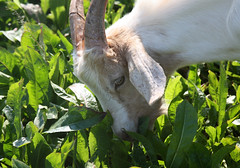 During a 66-day adaption period, ewes were dosed (3 d/wk) with infective parasite larvae (Teladorsagia circumcincta). During the last 45 days of the adaption period, ewes were supplemented with protein (or not). At the end of the period, ewes and lambs were turned out to parasitologically safe pasture, while ewes continued to be dosed with worm larvae and receive protein supplementation (or not). After an additional 43 more days of grazing the safe pasture, the ewes and their lambs were moved onto newly established experimental pastures sown with either chicory or grass/clover.
During a 66-day adaption period, ewes were dosed (3 d/wk) with infective parasite larvae (Teladorsagia circumcincta). During the last 45 days of the adaption period, ewes were supplemented with protein (or not). At the end of the period, ewes and lambs were turned out to parasitologically safe pasture, while ewes continued to be dosed with worm larvae and receive protein supplementation (or not). After an additional 43 more days of grazing the safe pasture, the ewes and their lambs were moved onto newly established experimental pastures sown with either chicory or grass/clover.During the safe pasture period, the supplemented ewes had decreased fecal egg counts and their lambs had temporary less fecal egg counts and grew faster than lambs from unsupplemented ewes. Lambs grazing chicory had consistently lower fecal egg counts and grew faster than lambs grazing grass/clover. Pasture larvae counts were lower for chicory. The researchers concluded that increased maternal protein nutrition and subsequent grazing of chicory independently improved lamb performance and reduced lamb parasitism.
Source: Journal of Animal Science, April 2010. Read abstract.

No comments:
Post a Comment